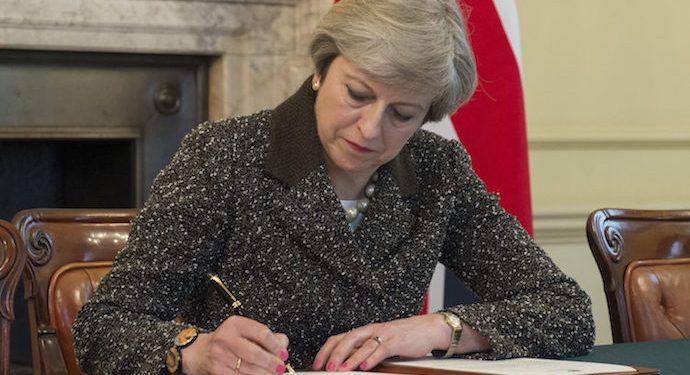UK education stakeholders have called on the government to ensure the sector remains welcoming to students from the EU, as Theresa May triggers Article 50, beginning the official process of leaving the European Union.
News and business analysis for Professionals in International Education
Have some pie!
UK educators react to triggering of Article 50
 Prime Minister Theresa May signs a letter of notification to leave the EU, to the President of the European Council. Photo: Jay Allen
Prime Minister Theresa May signs a letter of notification to leave the EU, to the President of the European Council. Photo: Jay Allen From today, negotiations will open up between the UK and EU over the next two years. Protecting the rights of EU citizens to live and work, and ensuring EU students are eligible for home fee status next year, are among the top priorities for education stakeholders.
While the signing of the article does not change anything immediately, Julia Goodfellow, president of Universities UK, said that there are some urgent steps which must be taken by the government in the transition.
“The government should provide reassurance to EU nationals currently working in the university sector on their rights to reside and work in the UK post-exit”
“The government should provide reassurance to EU nationals currently working in the university sector on their rights to reside and work in the UK post-exit,” said Goodfellow.
“Staff from EU countries make a vital contribution to university research and teaching and have a positive impact on the British economy and society.”
In an open letter, chair of the Russell Group, David Greenaway, and acting director, Tim Bradshaw, conceded that no long-term deal on EU citizens’ rights would be possible until after Article 50 talks begin.
“With negotiations now underway, we urge the Prime Minister to guarantee that EU citizens living and working in the UK will be able to stay and the rights they have at present will be respected,” they said.
The UK’s ELT sector, which is bouncing back after a tough 2015, is expected to remain strong this year, despite the Brexit dialogue, according to English UK‘s chief executive, Sarah Cooper.
Speaking to The PIE News, Cooper said some of the markets are not as concerned as she feared they might be.
“I think they’re taking it in their stride and thinking well no matter what’s going on, we still value the relationship we have with the UK, we still want to send our students there,” she said.
“I’m confident that it will continue, we just want to make sure that the priority of establishing what’s going to happen to European citizens is settled quite quickly, because I think that will help negate all those negative perceptions.”
Scotland recently announced the fee status for EU students enrolling in Scottish universities will be the same as domestic students for the 2018/19 intake, and there are calls for the UK government to follow suit.
“As EU students start their research about studying abroad more than 12 months in advance of actual enrolment, it is important that action is taken as soon as possible to prevent a further drop in EU applications for 2018/19 entry,” said Goodfellow.
Dominic Scott, chief executive of UKCISA, said the association’s priority is to distribute as much information as quickly as possible to students and prospective students.
“Clearly everyone will wish to see funding continue for as many mobility schemes as possible but, given the political will, there could also be opportunities to spread these more widely,” he told The PIE News.
“And, of course, to re-think completely the UK’s whole attitude and approach to all international students within a reformed migration policy.”
Throughout the negotiations, it is vital for the sector to remain welcoming to EU students and staff, stakeholders urged.
This must take place to ensure that “we can continue to access valuable and collaborative European research networks”, said Goodfellow.
John Latham, vice-chancellor of Coventry University, said: “UK higher education has a global outlook not just for student recruitment but in terms of business and research partnerships, meaning universities can help keep the UK competitive and open for business, in a way that transcends political negotiations.”
Cooper said it is important to keep the dialogue open with decision makers when it comes to the negotiating process.
“We also obviously sit on the Home Office education sector forum, so as policy is created, we are there to be consulted, so we’re active members of that,” she said.
“And we sit in various other forums, so I think we’re sitting at the right table.”
Still looking? Find by category:



Will the EU government reassign uk institutions as non eu, therefore requiring ‘re negotiation of Erasmus mobility agreements?